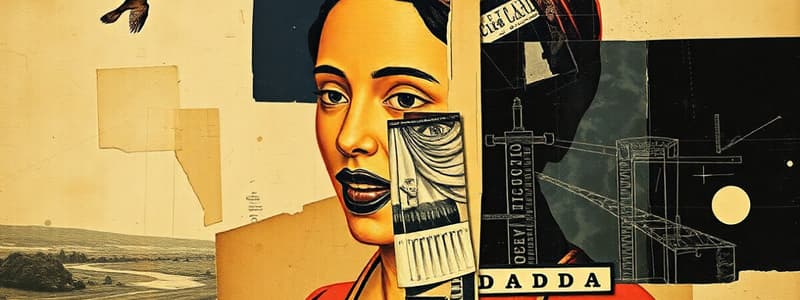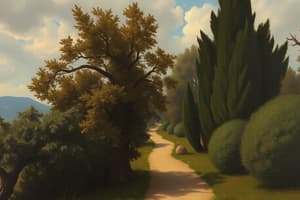Podcast
Questions and Answers
Which church is known for its 'earthquake baroque' style?
Which church is known for its 'earthquake baroque' style?
- Sto. Tomas de Villanueva Church
- San Agustin Church, Manila
- Baclayon Church
- San Agustin Church, Paoay (correct)
Baclayon Church was completed in the year 1777.
Baclayon Church was completed in the year 1777.
False (B)
What architectural style characterizes the Sto. Tomas de Villanueva Church?
What architectural style characterizes the Sto. Tomas de Villanueva Church?
Baroque-Romanesque
The San Agustin Church in Manila is located in __________.
The San Agustin Church in Manila is located in __________.
Match the following churches with their notable features:
Match the following churches with their notable features:
What was a key characteristic of Renaissance art?
What was a key characteristic of Renaissance art?
Renaissance art was primarily focused on religious themes and narratives.
Renaissance art was primarily focused on religious themes and narratives.
Name one notable sculpture created by Michelangelo.
Name one notable sculpture created by Michelangelo.
The technique of __________ involves the use of strong contrasts between light and dark.
The technique of __________ involves the use of strong contrasts between light and dark.
Match the following artists with their notable works:
Match the following artists with their notable works:
What significant architectural work was associated with the Renaissance?
What significant architectural work was associated with the Renaissance?
Linear perspective was an important breakthrough that allowed artists to create a sense of depth in their paintings.
Linear perspective was an important breakthrough that allowed artists to create a sense of depth in their paintings.
When did the Italian Renaissance begin?
When did the Italian Renaissance begin?
Which of the following works is a famous painting by Leonardo da Vinci?
Which of the following works is a famous painting by Leonardo da Vinci?
Humanism focuses solely on religious themes and divine subjects.
Humanism focuses solely on religious themes and divine subjects.
Name one characteristic of Baroque art.
Name one characteristic of Baroque art.
The technique that emphasizes contrast between light and dark is called __________.
The technique that emphasizes contrast between light and dark is called __________.
Match the following Baroque artists with their notable works:
Match the following Baroque artists with their notable works:
Which artwork features the visit of the Magi to Jesus?
Which artwork features the visit of the Magi to Jesus?
Diego Velasquez is known for his contributions to Impressionist art.
Diego Velasquez is known for his contributions to Impressionist art.
What is the primary subject of the painting 'Las Meninas' by Velasquez?
What is the primary subject of the painting 'Las Meninas' by Velasquez?
The __________ technique employed by artists during the Baroque period emphasized light and shadow.
The __________ technique employed by artists during the Baroque period emphasized light and shadow.
Match the following Renaissance artists with their descriptions:
Match the following Renaissance artists with their descriptions:
What was a significant achievement of Donatello's sculpture?
What was a significant achievement of Donatello's sculpture?
The term 'Baroque' originally referred to an irregularly shaped pearl.
The term 'Baroque' originally referred to an irregularly shaped pearl.
Identify one tendency of the Baroque era.
Identify one tendency of the Baroque era.
Michelangelo Merisi de Caravaggio is commonly known as __________.
Michelangelo Merisi de Caravaggio is commonly known as __________.
Flashcards
Renaissance Art
Renaissance Art
Art from the 14th-16th centuries, emphasizing realism, humanism, and scientific perspective.
Linear Perspective
Linear Perspective
Artistic technique to create depth and space in paintings using lines.
Chiaroscuro
Chiaroscuro
Using strong light/dark contrasts for volume and drama in Renaissance paintings.
Michelangelo
Michelangelo
Signup and view all the flashcards
Humanism (art)
Humanism (art)
Signup and view all the flashcards
Sistine Chapel
Sistine Chapel
Signup and view all the flashcards
Renaissance
Renaissance
Signup and view all the flashcards
Leonardo da Vinci
Leonardo da Vinci
Signup and view all the flashcards
San Agustin Church, Manila
San Agustin Church, Manila
Signup and view all the flashcards
Sto. Tomas de Villanueva Church, Miag-ao
Sto. Tomas de Villanueva Church, Miag-ao
Signup and view all the flashcards
San Agustin Church, Paoay
San Agustin Church, Paoay
Signup and view all the flashcards
Baclayon Church, Bohol
Baclayon Church, Bohol
Signup and view all the flashcards
Sta. Maria Church, Sta. Maria
Sta. Maria Church, Sta. Maria
Signup and view all the flashcards
Mona Lisa
Mona Lisa
Signup and view all the flashcards
The Last Supper
The Last Supper
Signup and view all the flashcards
Vitruvian Man
Vitruvian Man
Signup and view all the flashcards
High Renaissance
High Renaissance
Signup and view all the flashcards
Sistine Madonna
Sistine Madonna
Signup and view all the flashcards
The School of Athens
The School of Athens
Signup and view all the flashcards
Baroque art
Baroque art
Signup and view all the flashcards
Counter-Reformation
Counter-Reformation
Signup and view all the flashcards
Caravaggio
Caravaggio
Signup and view all the flashcards
Ecstasy of Saint Teresa
Ecstasy of Saint Teresa
Signup and view all the flashcards
Rubens
Rubens
Signup and view all the flashcards
Rembrandt
Rembrandt
Signup and view all the flashcards
Las Meninas
Las Meninas
Signup and view all the flashcards
Baroque architecture
Baroque architecture
Signup and view all the flashcards
Study Notes
Renaissance Art
- Began in the late 14th century, emphasizing realistic and humanistic themes.
- Key characteristics include accurate anatomy, scientific perspective, deeper landscapes, and naturalistic portraits.
- A period of artistic experimentation.
- St. Peter's Basilica rebuilding was significant.
- Marked the transition from medieval to early modern Europe.
- Renaissance style became prevalent by 1500.
Renaissance Art Techniques
- Used vibrant and vivid colors.
- Focused on human emotions and experiences (Humanism).
- Utilized techniques to create depth and realism in paintings (Perspective).
- Employed strong contrasts of light and dark to create effects and volume (Chiaroscuro).
Linear Perspective
- A significant advancement, allowing artists to create realistic depth and space.
Chiaroscuro
- Used strong contrasts between light and dark to add dimension and volume to paintings.
Famous Renaissance Artists and Works
-
Michelangelo (1475-1564):
- Preeminent Italian sculptor, painter, architect, and poet.
- Sculptures: Pieta, David, Moses
- Frescoes: The Last Judgment, Scenes from Genesis (Sistine Chapel).
- Art Techniques: Humanism, Chiaroscuro, Linear Perspective
-
Leonardo da Vinci (1452-1519):
- Quintessential "Renaissance man" (painting, architecture, science, mathematics).
- Major Works: Mona Lisa, The Last Supper, Vitruvian Man, Adoration of the Magi, Virgin of the Rocks.
- Art Technique: Chiaroscuro
-
Raphael (Raffaello Sanzio da Urbino) (1483-1520):
- High Renaissance painter and architect, known for clarity and composition.
- Major Works: The Sistine Madonna, The School of Athens, The Transfiguration.
-
Donatello (Donato di Niccolo di Betto Bardi) (1386-1466):
- Early Renaissance sculptor, known for bas-relief.
- Major Works: David, Statue of St. George, Equestrian Monument of Gattamelata.
- Art Techniques: Chiaroscuro, Humanism
Baroque Period
- Origin of "Baroque": Italian word describing an obstacle in schematic logic, or an irregularly shaped pearl.
- Characteristics: Exaggerated motion, clear detail, drama, exuberance, and grandeur. Used chiaroscuro.
Baroque Tendencies
- Counter-Reformation: Expansion of territory and intellect, abandoning Mannerism.
- Consolidation of Absolute Monarchies: Middle class's growing role in art patronage.
- New Interest in Nature/Intellectual Horizons: Scientific and global exploration influence.
Baroque Art Masters
-
Caravaggio (Michelangelo Merisi):
- Italian artist, deviated from classical masters.
- Notable work: Conversion of St. Paul (depicting a biblical event).
- Style: Still life, especially fruit.
-
Bernini (Gian Lorenzo):
- Italian Baroque artist (architecture, sculpture, painting, stage design, playwright).
- Prodigy: First art by age 8.
- Notable Work: Ecstasy of Saint Teresa (Cornaro Chapel, Santa Maria della Vitoria, Rome).
-
Rubens (Peter Paul):
- Flemish Baroque painter, known for mythical, figurative subjects, landscapes, portraits, Counter-Reformation altarpieces.
- Notable Work: The Raising of the Cross (depicting 9 figures raising the cross).
-
Rembrandt van Rijn:
- Dutch painter and etcher.
- Notable Works: The Raising of the Cross, The Night Watch.
-
Velázquez (Diego):
- Spanish painter, expert in composition.
- Notable Work: Las Meninas (The Maids of Honor).
Baroque Period in the Philippines
- Western influence in various art forms (painting, dancing, weaving, sculpting, pottery).
- 16th century introduction of Baroque style.
- Style used for churches, often with wide facades between towers.
- Religious propaganda through paintings in churches.
Notable Baroque Churches in the Philippines
- San Agustin Church, Manila: Oldest stone church in the Philippines, completed in 1607; Neoclassical-Baroque.
- Sto. Tomas de Villanueva Church, Miag-ao, Iloilo: Built between 1787 and 1797; Baroque-Romanesque style with intricate relief motifs.
- San Agustin Church, Paoay, Ilocos Norte: Completed in 1710, known for its "earthquake baroque" style.
- Baclayon Church, Bohol: Founded in 1596, completed in 1727; coral stone.
- Sta. Maria Church, Sta. Maria, Ilocos Sur: Built in 1765, on a hill with massive buttresses.
Studying That Suits You
Use AI to generate personalized quizzes and flashcards to suit your learning preferences.




